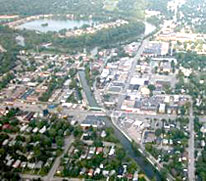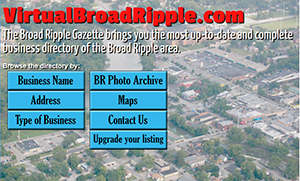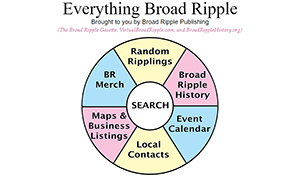
|
Broad Ripple Random Ripplings

The news from Broad Ripple
Brought to you by The Broad Ripple Gazette
(Delivering the news since 2004, every two weeks)

|
| Brought to you by: |

|

|

|

|

|

|
Converted from paper version of the Broad Ripple Gazette (v10n14)
Net Literacy at BRMHS sends technology where it's needed
posted: Jul. 19, 2013
On a hot summer morning, a bright orange box truck pulls up to the back entrance of Broad Ripple Magnet High School. Then another, and another. The Indianapolis Public Schools truck ramps are lowered, and the drivers begin rolling out wooden pallets and arranging them in lines along the sides of the hallways inside the school. Five or more pallets arrive in each truck, and the drivers leave the school after loading more to take with them. This process will repeat many times this week, throughout the entire summer. Walking through the hallways of the school is like something out of Indiana Jones. There aren't many people around because most of the students and teachers are gone for the summer. And there are row after row of plastic wrapped wooden pallets.

image courtesy of John S. Hague
What's on them? Computers. Lots of computers, PC towers and monitors. It's a graveyard of recently-discarded technology. For now. The students who participate in the Net Literacy program are there for the sole purpose of returning these plastic and metal boxes to life. A second life, in the home of a student's family who otherwise couldn't afford to have a computer in the home.
Net Literacy was started more than five years ago by a Carmel High School student, and it has spread across the state to many school systems. Although each school runs its program differently, they all operate under the same fundamental framework. When the State of Indiana decides to replace outdated or malfunctioning computer hardware, it sends the discarded agencies' equipment to warehouses and then on to schools like Broad Ripple. While many schools operate the Net Literacy program in the hours immediately after school each day, Broad Ripple has taken the approach of working during the summer months. This helps avoid conflicts with after-school programs like Band and Sports, but it also means the students must be responsible for arranging their own transportation to the school. Any adult working in IPS will tell you that's no small expectation. "A lot of [the information about this program spreads through] word of mouth." says TC, the IPS Computer Specialist who oversees the program at BRMHS. He hopes to expand to an after-school basis soon.
First, the hardware that arrives is moved into a nearby computer lab. The 14 students hook up monitors, keyboards, and mouses to the PC towers and press the power switch to see what happens. Sometimes there's nothing wrong and the unit's more or less ready-to-go. Sometimes nothing happens. The students (including Solomon Mabry, Krista Smock, a Dance Magnet student and Color Guard member, and Moshun Scott of the Theatre Magnet) learn to wipe the computers clean and re-install operating systems, effectively restoring the hardware to a new condition. "We average close to a hundred or more computers a day," says TC. "The first day we did 70, the second day we did 175. It just depends on how big a problem that particular batch is. We did 2,275 last year. This year we are already at 1,900, so we're shooting for 3,000 by the end of the summer."
Terry Carrithers BRHS IT specialist

image courtesy of John S. Hague
| Brought to you by: |

|

|

|
Once the 14 students working at Broad Ripple finish refurbishing the equipment, the computers are re-packaged on the pallets and delivered to participating district elementary schools throughout the city. The schools make them available free of charge to families that can't afford to get to a store or buy from a retailer.

image courtesy of John S. Hague
There's a problem with the workflow, however. Computer display technology has improved sufficiently in the recent past to increase the life-span of flatscreen LCD monitors, which means that fewer monitors are being delivered to Net Literacy schools than are PC towers. This is a problem, because Net Literacy aims to provide complete sets of towers, monitors, keyboards and mouses to under-privileged families, so a bottleneck is developing rapidly. TC and his students need more monitors and displays for the computers they fix. "Whatever we get, as long as it's working. Please don't send us stuff that doesn't work just to get rid of it!" You can donate your functional CRT ("tube-set") or LCD flat-panel displays to Broad Ripple's Net Literacy summer program by contacting TC at (317) 693-5739 or carritht@ips.k12.in.us .

image courtesy of John S. Hague
| Brought to you by: |

|

|

|

image courtesy of John S. Hague

image courtesy of John S. Hague
| Brought to you by: |

|

|

|

|

|

|
| Brought to you by: |


